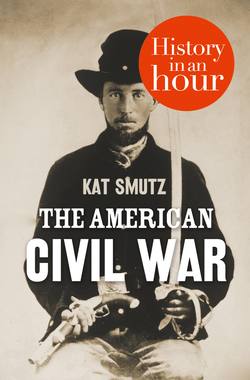Читать книгу The American Civil War: History in an Hour - Kat Smutz, Kat Smutz - Страница 9
ОглавлениеThe Generals
Save in the defense of my native State, I never desire again to draw my sword.
General Robert E. Lee, 20 April 1861
Lincoln realized that the nation was about to tear itself in half. He felt that secession was unconstitutional and refused to recognize the Confederate States of America as a separate country. He was determined to prevent the division of the country and the only way to do that was war. To fight a war, he needed an army. The United States Military Academy at West Point, New York held a reputation for providing the country’s military with officers whose education was focused on warfare, and many of the officers on both sides of the conflict were graduates of the prestigious school.
Although not a West Point graduate, Brevet Lieutenant General Winfield Scott was a commanding general of the Armies of the United States when war came. In spite of failing health, he managed to supervise recruitment and training to build up the army in order to wage war with the South. But Scott knew he would eventually have to step down and told Lincoln that he wanted a man named Robert Edward Lee (pictured below) as his top commander.
Robert E. Lee
Lee, originally from Virginia, was a career officer in the United States army. In private, he criticized the South, referring to secession as rebellion, and although a slaveholder himself, Lee supported his wife, Mary Custis Lee, in her efforts to benefit African-Americans, which included funding an illegal school for slaves at Arlington Plantation. Their plantation sat just across the Potomac River from Washington DC.
Lee’s personal opinions left him in a difficult position when he was offered the command of the Union army with the rank of major general. He knew that his home state of Virginia would follow the slave states and opt for secession. Lee’s loyalties were divided, but he could not bring himself to raise his hand against his own people. And so, after thirty-two years as an officer who had distinguished himself in the United States army, Robert E. Lee resigned in order to take command of the Confederate forces in Virginia. Like many graduates of the prestigious academy, Lee would find himself riding alongside fellow alumni while facing other West Pointers across a battlefield.
Lincoln’s priority was to hold the Union together by whatever means necessary, and he was constantly searching for the general who would end the war quickly. After the Union defeat at the First Battle of Bull Run (First Manassas), Winfield Scott’s health forced him to resign. On 1 November 1861, he was replaced by General George B. McClellan.
McClellan was another West Point graduate who had shown great promise. He had raised and trained the Army of the Potomac when political pressure forced Lincoln to retire Scott and replace him with McClellan. But he fell far short of Lincoln’s expectations. McClellan tended to spend too much time planning and preparing, to the point where the opportunity to face the enemy had passed by. He was accused of not being aggressive enough on the battlefield. McClellan and Lincoln’s dislike for one another didn’t help matters. Finally, on 11 March 1862, McClellan was relieved as general-in-chief of the Union army and returned to his command of the Army of the Potomac. For the remainder of the spring of 1862, Lincoln and a group of officers that he referred to as the ‘War Board’ directed military operations.
It was 23 July 1862 before Lincoln finally named a replacement for McClellan. Major General George Henry W. Halleck was another graduate of the United States Military Academy at West Point. Halleck was known as a scholar and had earned the nickname ‘Old Brains’. Unfortunately, his strengths lay in administration rather than planning strategy and commanding troops. It was less than a year before Lincoln replaced Halleck.
This time Lincoln seemed to have found the right man for the job. Lieutenant General Ulysses S. Grant had graduated from the United States Military Academy in 1843, but when the American Civil War began, he was a civilian. He went back to the army and was named a colonel in June 1861 and promoted to brigadier general in August that same year.
Grant was popular with his men, but not with other officers. Military promotions had become a political game, one that Grant didn’t fit well with. He was known to ride through camp in a private’s fatigue blouse (a uniform jacket), he drank too much, and most officers said he always seemed to be in a foul temper. But Grant got the job done. He set out to break the Confederate ranks and end the war and that’s what he did.
